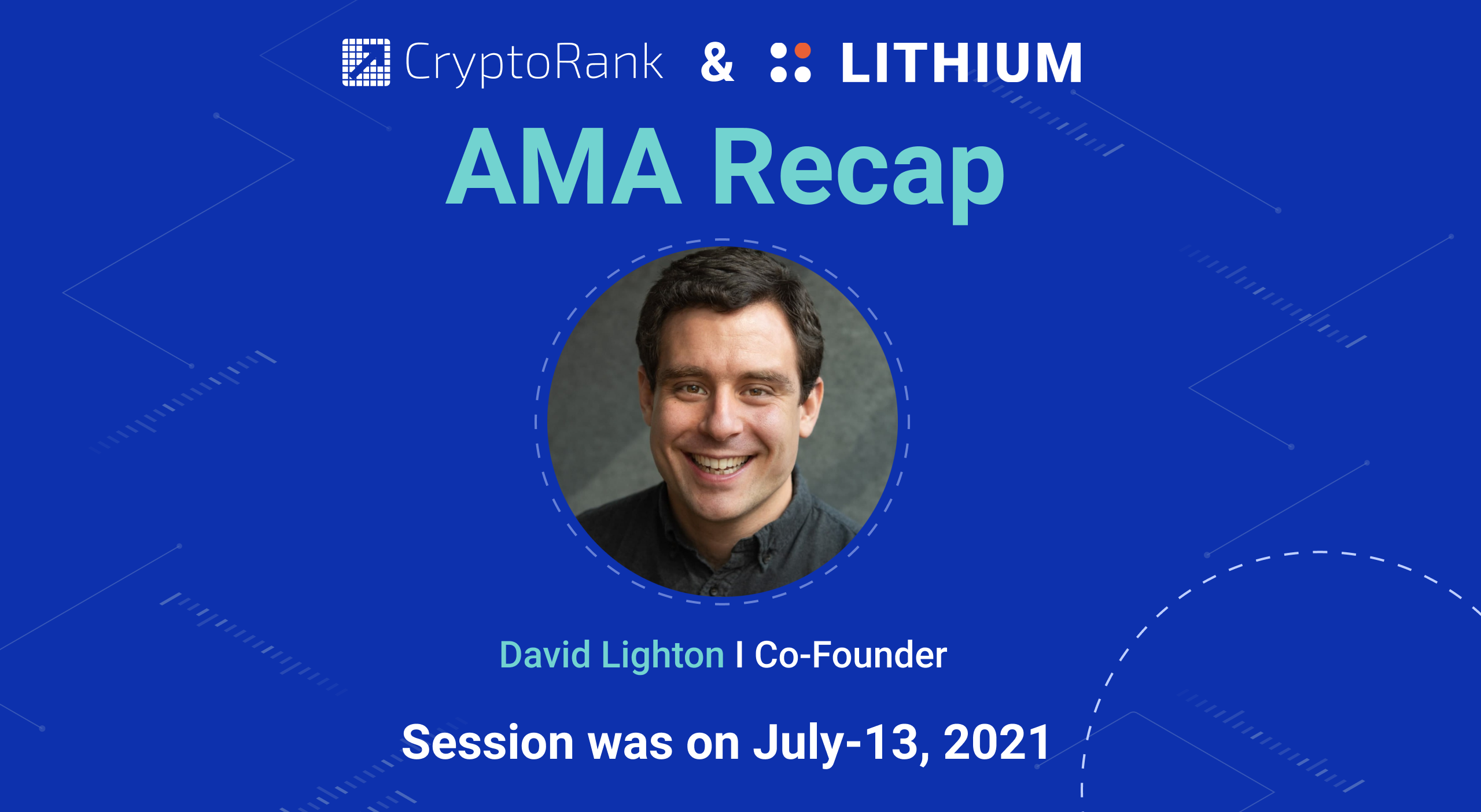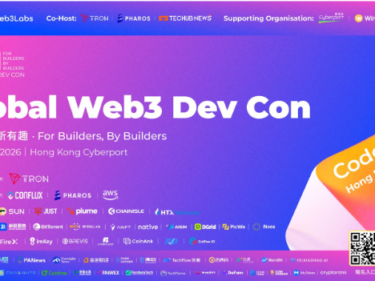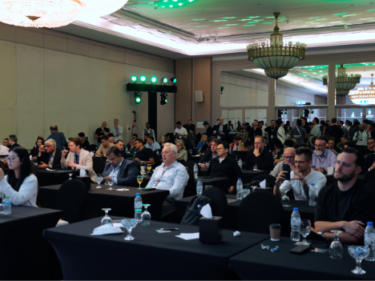Lithium Finance AMA Recap

Lithium Finance is at a unique point of convergence between blockchain, distributed expertise enabling a bridging between traditional finance and DeFi. It is the first protocol to regularly price illiquid assets.
Today we have David Lighton as Co-Founder of Lithium Finance joining us to answer our questions for the next hour.
 David Lighton, Lithium Finance Co-Founder
David Lighton, Lithium Finance Co-Founder
Before Lithium, I was the Founder and CEO of SendFriend, a FinTech startup using the blockchain to create faster, less expensive, and more inclusive international money transfers for immigrants in the US. Prior to founding SendFriend, I served as Special Assistant on the Haiti Desk in the World Bank following the devastating earthquake of 2010, and co-authored the Haiti National Financial Inclusion Strategy, a Central Bank-sponsored initiative to increase consumer account penetration from 25% to 50% of adults. I hold an MBA from MIT – Sloan School of Management and an M.A. and B.A. with honors from Johns Hopkins University.
Question from the CryptoRank team
#1. Can you tell us about Lithium? What problems do you solve, both in the space and for the community?
David: – Lithium is the first collective-intelligence pricing oracle to give precise and timely pricing on private, illiquid assets. We strongly believe that the traditional financial sector can be improved enormously through the tools of DeFi and cryptocurrency. As the DeFi space and the traditional finance world converge, the needs and expectations of having real-world assets in the DeFi space are also growing simultaneously. Pricing these assets in a decentralized manner is an inevitable process of bridging the two worlds together. Although existing oracles can bring pricing information to DeFi, most of these protocols cannot provide the information promptly. None of them are specialized in private and hard-to-value assets. With all that in mind, Lithium Finance — a new type of pricing oracle that uses collective intelligence to price the unpriced — could be the key to open the door and bring real-world assets into the DeFi space. My greatest hope for Lithium is to create a bridge between defi and traditional financial services and functions that opens doors for millions of users. We want to have top investors and institutional advisors as clients as well as the kinds of retail investors who made waves on social media.
#2. Could you shortly describe the milestones Lithium has achieved, and about your upcoming plans?
David: – The past few months have been an exciting journey for the team at Lithium Finance. From protocol design to fundraising, pre-IDO, and marketing, we won’t be able to be where we are today without the enormous support of all our investors. They have been backing Lithium not just financially but also in many other aspects. Our team has boarded several additional investors and raised an extra $2.6 million from them to ramp up our product rollout. That’s on top of the $5 million that we raised during the seed round co-led by Pantera and Hashed. Also We have onboarded FBG Capital, Coin98 Ventures, Shima Capital, PetRock Capital, Vessel Capital, Soul Capital, Gate.io, DuckDAO, AU21 Capital, ZBS Capital, Divergence Ventures, Autonomy Capital, Astronaut Capital, Ellipti, GAINS Associates, and more.
And for the upcoming plan, IDO is coming soon. Please stay tuned…our announcements page will be increasingly active over the next couple of weeks 🙂 follow along here: https://t.me/lithiumfinanceofficial or our Official Twitter account: https://twitter.com/LithiumFinance
Questions from Twitter
#1. Only getting users, holders etc is not everything. In my opinion, a project needs to deal with solving a real world issue or problem What is the problem that Lithium primarily focuses on?
David: – Currently DeFi protocols are constrained by lack of pricing of real world illiquid assets. Off-chain collateral requires informed pricing in order to execute corporate actions such as investments, liquidations and mergers and acquisitions. Creating a network of accurate and incentivized pricing experts for these off-chain assets is the critical missing link in enabling DeFi’s expansion from $77B+ to the real world assets of $100T — a 1300X increase. At the same time, we aren’t able to tokenize assets we can’t price. Pricing information for private and pre-IPO companies, while highly valued, is difficult to accurately predict; it is private and infrequently updated. Imagine how powerful it would be if we could access all global analysts and brokers with unique pricing knowledge and incentivize them to provide superior pricing? How can we coordinate and share the best aggregate pricing information and reward all participants? This is the challenge that Lithium Finance solves by combining pricing oracles together with economic incentives to ensure honest information is rewarded and malicious information is punished. The result is accurate, frequent pricing information of virtually all hard to value assets: pre-IPO stocks, private equity, and other illiquid assets — all accurately priced using Lithium Finance.
#2. There are many well-known approaches to AMM, how did Lithium approach ? What is Determinant-based Mutual Information (DMI) mechanism?
David: – Sure. I would like to explain more about it. Determinant-based Mutual Information (DMI) mechanism consists of two major stakeholders in the Lithium system: Wisdom Nodes; and Wisdom Seekers. Those seeking answers to questions about the price of an asset will use LITH tokens — Lithium’s native token — to provide a bounty, and those with expertise in delivering answers will stake LITH to signal confidence in their answers. This method of finding the dominant truth by asking subject questions is known as the Determinant-based Mutual Information mechanism or DMI-Mechanism. With Lithium Finance and its powerful DMI mechanism, we will be able to source prices for any asset through a decentralized honest-rewarding protocol, all on-chain.
The theorems behind our DMI-mechanism can be found here in our Litepaper. https://lith.finance/Lithium_Finance_Litepaper.pdf
#3. Many projects have different types of token economies to maintain the ecosystem. Usually systems like Staking/Burn/Buyback are used, but does Lithium plan to use a system like staking?
David: – Lithium Finance’s native token, $LITH will be used as a reward mechanism and as a staking token for questions and answers. It is essentially the fuel that powers the Lithium ecosystem. During the process of posing a question and answering, each individual will stake a certain amount as either bounty (when asking a question) or confidence (when answering). This combination of staking creates stronger signals towards the best information. Bounty offers from Wisdom Seekers will incentivize Wisdom Node answers. The more valuable information is to someone, the more they are willing to pay for an answer. With many people wanting access to the same information, the bounty can become substantial. It is also a way for Wisdom Nodes to build their reputation and further increase their reward potential for correct information. When each Wisdom Node provides an answer to the question, they will stake a certain amount of LITH tokens to signal their confidence. This together with their reputation within the sector of answers increase their influence and also potential reward of the bounty plus other incorrect stakers. Lastly, the token facilitates rewards for Wisdom Nodes for correct answers. Once the Wisdom Nodes’ answers are known, the bounties of $LITH and the Wisdom Node stakes are pooled and distributed according to how close their answers came to the ground truth.
The $LITH token is one that forms the bedrock of a robust use-case. Lithium Finance’s cutting-edge pricing oracle will revolutionize the world of finance by making accurate pricing for illiquid assets accessible to one and all. The LITH token powers this fascinating movement. Members can hold Lithium tokens and become part owners in the protocol, and get a high reputation by doing so. Members can realistically make meaningful profits on the platform as the reputation multiplied by the value of staking is the value you can take away from the platform.
Questions from Telegram
#1. What are you doing to promote your project in countries where different languages are spoken?
David: – This is a great question. We are trying to do AMAs around the world and have some coming up with India and Turkey. If you have any advice for us on where to do AMAs, please don’t hesitate to let us know in our official telegram chat !!!
#2. In the introduction aspect you said your greatest hope for Lithium is to create a bridge between Defi and traditional financial services and functions that opens doors for millions of users. You will agree with me that vast majority of of your potential users still do not know how blockchain/crypto works, so is your project designed in such a way that the non-crypto guru will be able to use? How will you ensure that the Lithium financial platform is as simple as ABC for beginners to navigate through?
David: – We are taking care so that the UI is very straightforward. Our view on this is that Lithium does not need to be too crypto-oriented since it is a utility coin and the ecosystem we are building is really about private asset valuations. We believe the fact that we are a DeFi project should not really impact our value proposition.
#3. Can experts and investors with knowledge of the latest pricing of private companies serve as nodes of wisdom in Lithuim? Who is included in the wisdom knots and what is the advantage?
David: – This is a great question. Anyone, really anyone, can serve as a wisdom node. However, wisdom nodes will be rewarded based on the quality of their contributions to the protocol and over time will develop reputations. This will allow the protocol to differentiate between good and great answers 🙂



